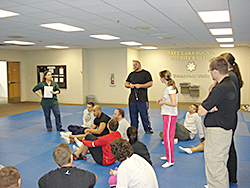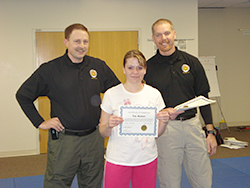Residential Instructor Training
A train-the-trainer certification for residential instructors is two weeks in length. During the two weeks there is a strong emphasis on cognitive behavioral techniques for de-escalating hostile, anxious and/or dangerous behavior. The verbal de-escalation techniques are designed and scripted to compliment existing evidence-based therapeutic interventions used by counselors and treatment staff.
Trainers will receive instruction and certification to teach up to twenty-six different control tactics depending on the size, age and developmental characteristics of their clients. Accompanying this training is an intense understanding of the risks and liabilities of use-of-force and includes preparing instructors to understand and explain home agency policy and procedure. The techniques are designed and intended to be applied as part of a team’s application of control so as to minimize injury to client and employee.
Trainers will receive hands-on instruction and certification in how to demonstrate and teach certain self-defense techniques. Included in this section is an expectation that trainers be able to differentiate self-defense from use-of-force and articulate the state’s and agencies policies for both.
 Interspersed throughout the train-the-trainer course are instructor development blocks where trainers learn how and why we teach psychomotor skills differently than cognitive skills; how and why we teach adult learners differently than we were taught as children in school. Trainers will perform and be evaluated on their ability to perform “teach-backs” to their fellow trainers using the different instructional models. Feedback is given so that trainers are prepared for their first class room assignments upon return to their home facility or office.
Interspersed throughout the train-the-trainer course are instructor development blocks where trainers learn how and why we teach psychomotor skills differently than cognitive skills; how and why we teach adult learners differently than we were taught as children in school. Trainers will perform and be evaluated on their ability to perform “teach-backs” to their fellow trainers using the different instructional models. Feedback is given so that trainers are prepared for their first class room assignments upon return to their home facility or office.
Community Parole/Probation Instructor Training
Integrated Crisis Response provides a quality assurance process after the train-the-trainer certification where-by we co-facilitate trainings in the classroom with all or a select number of new home agency trainers. This provides a measure of the train-the-trainers course effectiveness and a safety net for new instructors when delivering the curriculum and until such time a degree of subject mastery is attained. We provide feedback in a format that’s structured and focused upon the process of connecting critical learning objectives of the agency training to individual needs of learners.
A train-the-trainer certification for community parole/probation instructors is one week in length. During the week perspective trainers are trained with an emphasis on cognitive behavioral techniques for de-escalating hostile, anxious and/or dangerous behavior. The verbal de-escalation techniques are designed and scripted to compliment existing evidence-based therapeutic interventions used by parole counselors and contracted treatment staff.
Trainers will receive instructional blocks on office and field safety, verbal de-escalation, arrest techniques, search/seizure, proper application of mechanical restraints and transport. Community parole/probation is not given hands-on instruction on control techniques. However, if a state or agency policy requires these employees to use force in order to affect arrest, control tactics can be taught and certified to trainers.
Similar to the residential trainers, community trainers will receive hands-on instruction and certification in how to demonstrate and teach certain self-defense techniques. Included in this section is an expectation that trainers be able to differentiate self-defense from use-of-force and articulate the state’s and agencies policies for both. In the community train-the-trainer course this section is expanded to include assessment of environmental threats in both the office and field setting (dogs, hostile individuals, etc.).
 Interspersed throughout the train-the-trainer course are instructor development blocks where trainers learn how and why we teach psychomotor skills differently than cognitive skills; how and why we teach adult learners differently than we were taught as children in school. Trainers will perform and be evaluated on their ability to perform “teach-backs” to their fellow trainers using the different instructional models. Feedback is given so that trainers are prepared for their first class room assignments upon return to their home facility or office. Trainers are also taught the process of giving and receiving feedback in the classroom so as to prepare them to do so in their own classroom.
Interspersed throughout the train-the-trainer course are instructor development blocks where trainers learn how and why we teach psychomotor skills differently than cognitive skills; how and why we teach adult learners differently than we were taught as children in school. Trainers will perform and be evaluated on their ability to perform “teach-backs” to their fellow trainers using the different instructional models. Feedback is given so that trainers are prepared for their first class room assignments upon return to their home facility or office. Trainers are also taught the process of giving and receiving feedback in the classroom so as to prepare them to do so in their own classroom.
The same Quality Assurance process is offered for this train-the-trainer course.